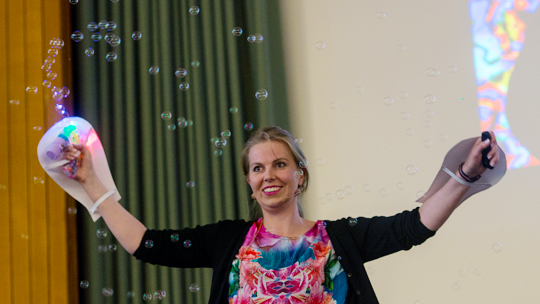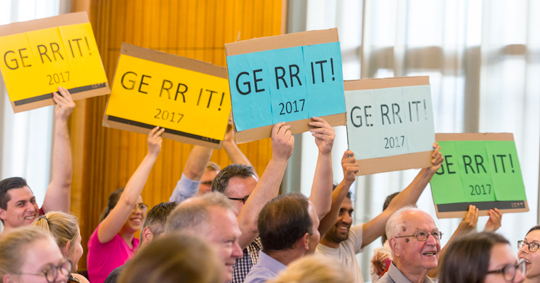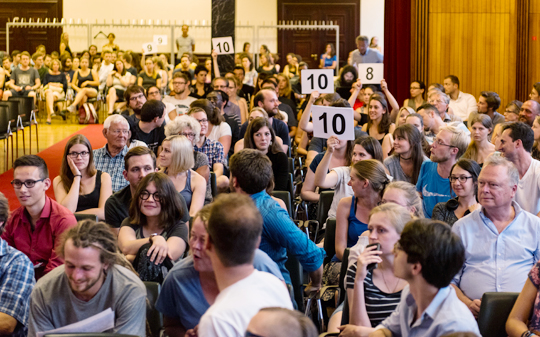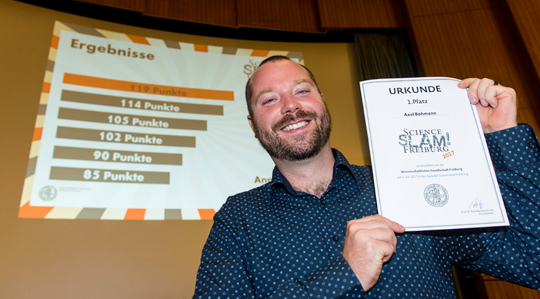Artistic auditorium
Freiburg, Jul 14, 2017
The auditorium, collegiate building I, 7pm, full house: The second Science Slam by the Scientific Society Freiburg presented six young scientists in ten-minute talks about their research. Whether bribery through bonbons, US President Donald Trump’s tweets, selfies from antiquity or furry viruses: The crowd got to decide the winner in the end – but not before ending a neck-and-neck race.

Anna Krohmer excites the crowd with psychedelic air bubbles – the audience nearly crowned her the winner. Photo: Patrick Seeger
Ten minutes is all each participate had to make his or her own research project public. And in such a way that the audience was not only better informed afterward, but also had worked its tummy muscles through laughter. Raise the curtain for this year’s Science Slam. 350 onlookers are sitting in the auditorium of the collegiate building I. They have the power: Tonight they will hear six talks and vote with points and applause for the rightful winner.
Bribing with bonbons
Gerrit Gonschorek opens the evening. But first, the economist passes out bonbons to the audience. Strategic bribery: He examines the principles according to which the government in Indonesia distributes funding amongst the various districts in the country. Should he hand out bonbons to the audience members who appear to have low blood sugar – that is, to those in need -- or to the audience members with the voting tablets who will decide which talk was the best one at the end of the evening? “I could also hand out more bonbons to my girlfriend in the second row simply because I think it’s a good idea,” he explained the various possibilities along with the empirical methods he used to approach the issue, accompanied by travel photos. Although there aren’t any more bonbons left over, the Slammer gets a huge applause.

Colorful applause: Gerrit Gonschorek had a well-organized fan block. Photo: Patrick Seeger
A strong start, but the competition will not sleep. The archaeologist Annemarie Schantor talks about clothing, selfies and gender reassignments in antiquity. The immunologist Julia Braun talks about the impact of co-stimulatory molecules on zytotoxic T-cells using furry viruses and superheroes from the Marvel universe. And Hanna Kilian, psychologist, reports on deep brain stimulation by depression – and somehow makes the audience laugh despite how dark her topic was.
“It is important for me to be able to show the broadest audience possible the breadth and depth of our university’s research and the level of quality it has,” says Prof. Dr. Karl-Reinhard Volz. He is the chairman of the Academic Society Freiburg that funds research at the university and, in particular, young academics. “The Science Slam is intended to dig deeper into the conscience of our young scientists.” That is why only slammers from Freiburg are standing on stage. In between presentations, the students Thomas Wiebe and Benjamin Ries at the College of Music help set the mood: They have written a Science Slam song especially for the evening.
Lazy Researchers and 50 Shades of Grey
Nearly every topic can be presented in a publicly appealing way: For six speakers the Scientific Society organized a workshop under the direction of a professional slammer who gave them tips on how to make their topics more publicly accessible.

On point: The audience judges each talk. Photo: Patrick Seeger
“My topic is how to use foreign planets to combat world hunger,” announces Dr. Axel Bohmann and seizes the audience’s attention throughout the entire auditorium. “Just kidding. I’m a linguist. But you underestimate the power of us philologists: Our laziness,” he explains, thereby making it appealing for the audience to digest the automatic text analysis.
Relying on multiple images, Bohmann explains the linguistic analysis of newspaper articles, high literature – he shows the book cover of 50 Shades of Grey – and even higher literature: a tweet from US President Donald Trump. In the end everyone is clear what he is talking about: that linguistics are too lazy to read and that people can save a lot of time using Bohmann’s text analysis program.
And finally, the pharmacologist Anna Krohmer explains why you can’t use endogenous cannabinoids and therefore are still obliged to enter the Stühlinger park at night if you want drugs. She announces „cheap showmanship“ – and keeps her world: With artistic psychedelically designed transparencies, synaptic gloves and bubbles, she provides the greatest show of the evening. The crowd goes wild.
Neck and Neck
It is a neck-and-neck race. After a long break, in which the audience had a deep discussion, the audience members hold up their tablets. You can only see one 5. All the rest are higher. Bohmann is the first to cash in multiple nines and tens. But Krohmer starts to gain momentum. It is a tight race: Bohman, who has participated in the Science Slam for the first time – wins – and seems rather incredulous. He remembers the workshop he took the week before. “I notice then and there that my original plan to offer a slightly altered version of a conference presentation I had given was completely out of place,” he explains. The lecturer predicted he would have a very hard time making his presentation interesting. “Maybe that is what it took to give me the final push to go the extra mile. At any rate I tossed everything in the trash and started completely from scratch two days before the event.

Axel Bohmann gets first place and was surprised: Two days before his presentation he tossed his entire speech in the trash and started from scratch. Photo: Patrick Seeger
Practicing for 2018
The applause is for everyone. A great program, excellent speeches – and people even learned something too. The audience slowly moves to the Prometheus hall to reflect on the evening with a glass of wine. Volz is visibly pleased with the event: “The room was completely full for a second time. Standing room only. It couldn’t have gone any better.” He finds it a shame that not many scientists have shown interest in participating in the Science Slam. “The doctoral students often have second thoughts that their doctoral supervisors might not accept it. Personally, I have always been happy when my doctoral students showed the ability to sell their ideas well.”
The next Science Slam is taking place in 2018. Whoever wants to give it a try as a slammer: you have plenty of time to practice.
Sarah Schwarzkopf
Scientific Society Freiburg
www.wissges.uni-freiburg.de

